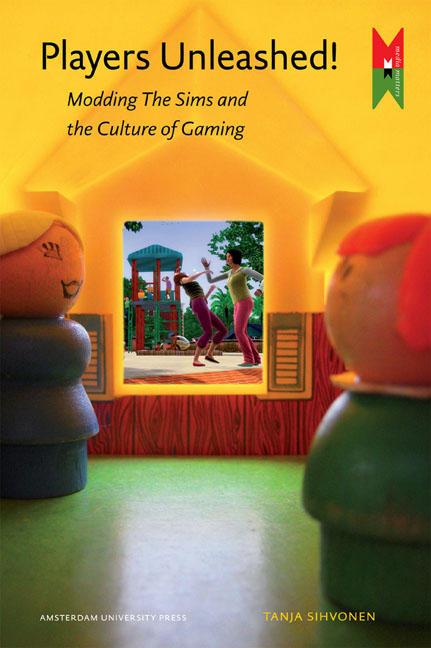IV - Negotiating the Code
Published online by Cambridge University Press: 22 January 2021
Summary
Playing with the Sims
As I have previously argued, interpretation and configuration, acting as the basis for the processes of meaning-making in gameplay and manifesting themselves in the physical activities of play, are closely tied to the representational qualities of The Sims. It may be true, however, that in the context of digital games, The Sims is an exception in this regard. James Newman (2002, 2), for instance, criticises the strong cultural studies tradition of theory building through concepts like (graphical) representation used to explain the pleasures of gameplay. He argues that for instance the appearance of game characters is not important to the primary player during gameplay, but the way the gameworld feels to the player is absolutely crucial – and in this process the game character acts merely as a vessel whose functionality is judged on the basis of the game's playability. The kinaesthetic experience of play is thus tied to the controls and mechanics of a game, and the character, the player's avatar, represents the possibility or a ‘capacity’ to undergo a game in a specific way (e.g. Jenkins 2005). The degree to which the player considers herself to ‘be’ her avatar, or the game character she plays, is not contingent upon representation, but a ‘character’ – be it a blinking white light or a MMORPG warrior tuned-up to the max level – is rather a set of characteristics, a tool with which to operate within the gameworld (Newman 2002, 7).
In principle, it is tempting to agree with Newman on the argument that the representation of game characters in the process of gameplay, for the experience of the player, is not a key issue in the study of games. However, it cannot be concluded that representation – associated with the interpretive dimension of gameplay and modding – does not matter in the context of games at all. In extra-game contexts, such as in the creation of gamics and machinima through the redirection of the game engine as well as game advertisements and dedicated fan websites, the representational aspect of game characters is often extremely important. It could be said that game characters, particularly the ones like Lara Croft and plumber Mario, outside the scope of game, are ‘representationalised’ in so far that they are assumed to incorporate an identity of their own.
- Type
- Chapter
- Information
- Players Unleashed!Modding The Sims and the Culture of Gaming, pp. 123 - 156Publisher: Amsterdam University PressPrint publication year: 2012



